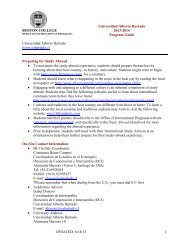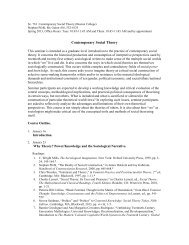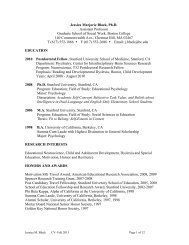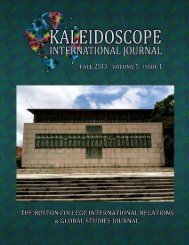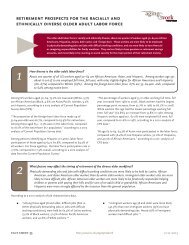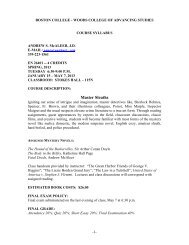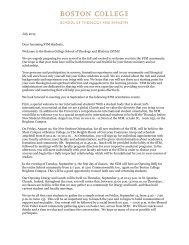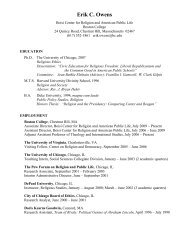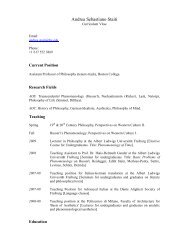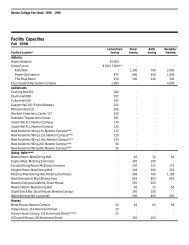separation of powers in thought and practice? - Boston College
separation of powers in thought and practice? - Boston College
separation of powers in thought and practice? - Boston College
You also want an ePaper? Increase the reach of your titles
YUMPU automatically turns print PDFs into web optimized ePapers that Google loves.
2013] Separation <strong>of</strong> Powers <strong>in</strong> Thought <strong>and</strong> Practice? 463<br />
to prevent this retroactivity reach<strong>in</strong>g further <strong>in</strong>to the legal system.101<br />
Maybe the difficulties are neither avoidable nor <strong>in</strong>superable, but they<br />
are the k<strong>in</strong>d <strong>of</strong> difficulties that arise when the logic <strong>of</strong> one k<strong>in</strong>d <strong>of</strong> governance<br />
function is contam<strong>in</strong>ated with another. The Separation <strong>of</strong><br />
Powers endorses <strong>and</strong> upholds the dist<strong>in</strong>ct character <strong>of</strong> each <strong>of</strong> the<br />
three functions <strong>of</strong> government, <strong>and</strong> what we see <strong>in</strong> the case <strong>of</strong> adjudication<br />
is that can impose on legal governance.<br />
It is a little harder to see the threats that the executive faces <strong>in</strong> this<br />
regard—the threats to the <strong>in</strong>tegrity or purity <strong>of</strong> its essential function.<br />
This is partly because the executive usually seems to be the aggressor <strong>in</strong><br />
<strong>separation</strong>-<strong>of</strong>-<strong>powers</strong> issues: it is always the executive threaten<strong>in</strong>g the<br />
<strong>in</strong>dependence <strong>of</strong> the judiciary or the executive underm<strong>in</strong><strong>in</strong>g the <strong>in</strong>tegrity<br />
<strong>of</strong> a dist<strong>in</strong>ct legislative process.102 When this happens, the executive<br />
is usually conceived to be powerful enough that the damage, if there is<br />
any, is always done to the other power <strong>in</strong> the equation. So it is hard to<br />
th<strong>in</strong>k <strong>of</strong> cases where the <strong>in</strong>tegrity <strong>of</strong> the executive’s dist<strong>in</strong>ct function <strong>in</strong><br />
government is corrupted by the encroachment <strong>of</strong> the other <strong>powers</strong>.<br />
Still, the sort <strong>of</strong> th<strong>in</strong>g that might be at stake here can be illustrated<br />
by a couple <strong>of</strong> examples, neither <strong>of</strong> them perfect. Forgett<strong>in</strong>g for the<br />
moment John Locke’s dist<strong>in</strong>ction between the executive <strong>and</strong> the federative<br />
<strong>powers</strong>, we may want to say that control <strong>of</strong> military action <strong>and</strong> the<br />
conduct <strong>of</strong> war is a qu<strong>in</strong>tessential executive function. Both generals <strong>and</strong><br />
executive <strong>of</strong>ficials <strong>of</strong>ten compla<strong>in</strong> about the encroachment <strong>of</strong> the judiciary<br />
on the conduct <strong>of</strong> armed operations: they say, “You cannot hold<br />
hear<strong>in</strong>gs on the battlefield.”103 This is a sort <strong>of</strong> illustration <strong>of</strong> apprehen-<br />
101 Teague v. Lane, 489 U.S. 288, 296 (1989) (hold<strong>in</strong>g that the petitioner could not<br />
benefit from a Supreme Court decision decided after his murder conviction became f<strong>in</strong>al).<br />
102 See Vile, supra note 9, at 408 (cit<strong>in</strong>g the “exercise <strong>of</strong> presidential power to commit<br />
American troops abroad without congressional approval” as an abuse <strong>of</strong> power); Mart<strong>in</strong> S.<br />
Flaherty, The Most Dangerous Branch, 105 Yale L.J. 1725, 1728 (1996) (“[T]he President<br />
comm<strong>and</strong>s the largest military establishment on earth <strong>and</strong> the massive security apparatus<br />
that goes with it. F<strong>in</strong>ally, the President ma<strong>in</strong>ta<strong>in</strong>s either direct or primary control over the<br />
‘adm<strong>in</strong>istrative state,’ the colossal array <strong>of</strong> agencies that legislate <strong>and</strong> adjudicate under any<br />
but the broadest def<strong>in</strong>ition <strong>of</strong> ‘execut<strong>in</strong>g’ the laws.”); see also Ex parte Merryman, 17 F. Cas.<br />
144, 149 (C.C.D. Md. 1861) (No. 9487) (Taney, C.J.) (stat<strong>in</strong>g that the President does not<br />
have the power to suspend the writ <strong>of</strong> habeas corpus, for <strong>in</strong> do<strong>in</strong>g so he “certa<strong>in</strong>ly does not<br />
faithfully execute the laws, if he takes upon himself legislative power, by suspend<strong>in</strong>g the<br />
writ <strong>of</strong> habeas corpus, <strong>and</strong> the judicial power also, by arrest<strong>in</strong>g <strong>and</strong> imprison<strong>in</strong>g a person<br />
without due process <strong>of</strong> law”).<br />
103 See Detention, Treatment, <strong>and</strong> Trial <strong>of</strong> Certa<strong>in</strong> Non-Citizens <strong>in</strong> the War Aga<strong>in</strong>st Terrorism<br />
§ 1(f), 66 Fed. Reg. 57,833, 57,833 (Nov. 16, 2001). The Military Order provides:<br />
Given the danger to the safety <strong>of</strong> the United States <strong>and</strong> the nature <strong>of</strong> <strong>in</strong>ternational<br />
terrorism, <strong>and</strong> to the extent provided by <strong>and</strong> under this order, I f<strong>in</strong>d<br />
consistent with section 836 <strong>of</strong> title 10, United States Code, that it is not prac-



